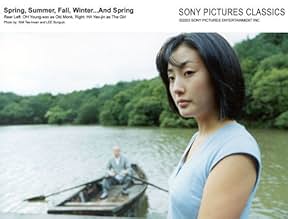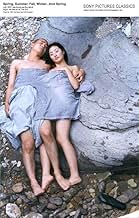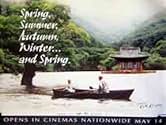Printemps, été, automne, hiver... et printemps
Titre original : Bom yeoreum gaeul gyeoul geurigo bom
- 2003
- Tous publics
- 1h 43min
Un garçon est élevé par un moine bouddhiste sur un temple flottant isolé où les années passent comme les saisons.Un garçon est élevé par un moine bouddhiste sur un temple flottant isolé où les années passent comme les saisons.Un garçon est élevé par un moine bouddhiste sur un temple flottant isolé où les années passent comme les saisons.
- Réalisation
- Scénario
- Casting principal
- Récompenses
- 15 victoires et 9 nominations au total
Oh Yeong-su
- Old Monk
- (as Young-soo Oh)
Seo Jae-kyeong
- Boy Monk
- (as Jae-kyeong Seo)
Ji Dae-han
- Detective Ji
- (as Dae-han Ji)
Avis à la une
This film left me speechless, and I still have a hard time putting how I feel about this movie into words. After seeing it the first time in the theater, my friend and I couldn't bring ourselves to say a word to each other...not even in the car on the ride back. The second time I saw it, after purchasing it, another friend and I walked around the campus for half an hour in silence. The third time, a friend and I sat in silence in her room for an hour after the movie was over. This film is that profound, touching, and moving.
Spring, Summer, Fall, Winter...Spring is the most beautiful movie I have ever seen. Visually it is fantastic, though several films surpass it in this aspect. However, the film manages to speak directly to the soul (or...failing to believe in the soul...something deep inside anyone watching it), and this is where it's beauty lies. Parts are so affecting that a painful nostalgia for a place you never knew overwhelms you.
I am sorry I cannot be more helpful...the quality that makes this movie so wonderful is well beyond words for me.
Spring, Summer, Fall, Winter...Spring is the most beautiful movie I have ever seen. Visually it is fantastic, though several films surpass it in this aspect. However, the film manages to speak directly to the soul (or...failing to believe in the soul...something deep inside anyone watching it), and this is where it's beauty lies. Parts are so affecting that a painful nostalgia for a place you never knew overwhelms you.
I am sorry I cannot be more helpful...the quality that makes this movie so wonderful is well beyond words for me.
I'm constantly amazed by the appearance of some seemingly off-the-wall piece of art that when you view it evokes a stunning effect. The simplicity of this film, its low-key action and pace, its visual surrealistic beauty, all interact to create an emotional impression that is long-lasting and thought-provoking. Korea has been somewhat slower to enter the international cinematic world and here is a film with actors whose names stir little or no recognition. For myself, who has enjoyed the Korean films I've seen before, it was a delightful surprise. The film itself is a wonderful tapestry of Korean Buddhist culture, with quiet visual beauty, simple moral themes and human passions put into a simple, homespun perspective. The remarkable natural setting which reflects the wide spectrum of Korea's seasons, which range from hot, sticky humid-fraught summers to icy, cold snow-bound winters, become a metaphor of life with unadorned figures, completely human in form. The old monk becomes a witness to the interplay of human qualities, without judgment yet with a complete and quiet moral presence. The foibles of child cruelty is met with a simple retribution which imparts a lasting lesson. Judgment is always withheld and warnings are given simply. The effect of all of this rings long and lasting, much like the impression of a delicate Korean silk print: simple in design with plain brush strokes and stylized representations of nature-- yet, lasting in impression, often to the point of being unforgettable. I buy few videos and DVDs, preferring to see things I really enjoyed again and again. But, I've ordered this one.
Perfect Simplicity
My review of this film should end with those two words. However, the 10 line minimum requirement that IMDb requires of all reviews belies the differences between my world and the world shown to me in Spring, Summer, Fall, Winter and Spring. I understand why IMDb does not want 1000's of (apparently) useless two-word reviews in their database. However, I would hope that they could make an exception for this film.
Perfect: The film is as close to perfect as a film could get. No shot is presented to us, nor a line of dialog uttered that does not make us ponder and understand at the same time. The film is also beautiful. (Like the previous reviewer, I am a fan of Asian cinema and never tire of the stunning ability of Asian directors to capture beauty on film.) This film exceeds most other Asian films I have seen in the cinematography regard. However, its beauty is surprisingly deceptive. Like most great films, it surpasses the 'cinematography' level of beauty and delves into the beauty of existence through its story. For example, the Old Monk has a different pet during each 'season' of his life. This is not discussed by the characters nor shoved in our face by the director as would have been done if Hollywood had done this film. It is merely background we experience and come to understand. Two days after viewing the film, I am still finding new reflections in my mind that encompass the cinematography, the literal story and the underlying context of the film.
Simplicity: This film approaches a level of cinematic Haiku. While I don't recall the entire dialog with any specificity, I am sure you could print the script on one page of paper. The amazing part is that while you are watching the film, you don't notice this. Every shot moves the story along. The simplicity of life as shown by the story is reflected in the simplicity of the film. After the film ended, I had a strong urge to move away from civilization and live or die in peace with nature. I enjoy (and have come to be too dependent upon) modern inventions, so I will stay at home. However, this film will remain in my heart. It does exactly what good story-telling is supposed to do: Take us completely out of our world and put us in another. There is no wonder that this film was selected for so many film festivals.
My review of this film should end with those two words. However, the 10 line minimum requirement that IMDb requires of all reviews belies the differences between my world and the world shown to me in Spring, Summer, Fall, Winter and Spring. I understand why IMDb does not want 1000's of (apparently) useless two-word reviews in their database. However, I would hope that they could make an exception for this film.
Perfect: The film is as close to perfect as a film could get. No shot is presented to us, nor a line of dialog uttered that does not make us ponder and understand at the same time. The film is also beautiful. (Like the previous reviewer, I am a fan of Asian cinema and never tire of the stunning ability of Asian directors to capture beauty on film.) This film exceeds most other Asian films I have seen in the cinematography regard. However, its beauty is surprisingly deceptive. Like most great films, it surpasses the 'cinematography' level of beauty and delves into the beauty of existence through its story. For example, the Old Monk has a different pet during each 'season' of his life. This is not discussed by the characters nor shoved in our face by the director as would have been done if Hollywood had done this film. It is merely background we experience and come to understand. Two days after viewing the film, I am still finding new reflections in my mind that encompass the cinematography, the literal story and the underlying context of the film.
Simplicity: This film approaches a level of cinematic Haiku. While I don't recall the entire dialog with any specificity, I am sure you could print the script on one page of paper. The amazing part is that while you are watching the film, you don't notice this. Every shot moves the story along. The simplicity of life as shown by the story is reflected in the simplicity of the film. After the film ended, I had a strong urge to move away from civilization and live or die in peace with nature. I enjoy (and have come to be too dependent upon) modern inventions, so I will stay at home. However, this film will remain in my heart. It does exactly what good story-telling is supposed to do: Take us completely out of our world and put us in another. There is no wonder that this film was selected for so many film festivals.
The circle of life is everlasting. We, as busy humans, sometimes miss the opportunity to see it in full effect. The modern day conveniences of life and the hustle and bustle of work sometimes fog our eyes to the constantly moving world. Thankfully we have films like Spring, Summer, Fall, Winter
and Spring, to help guide us back to our roots. Through each season, director Ki-duk Kim shows us the journey of one young boy as he learns life through the hands and mind of an older monk. Through events that are beyond his control, this young boy learns about love, lust, jealousy, hatred, and eventually rage. He makes choices that ultimately effect his life causing turmoil and distress, yet somehow continually finds his way back to the floating house on the lake where his journey began. It is during his final visit home he learns of his final journey in life. As a new soul is handed to him, he embarks on a final journey using his master's lesson, to pay homage to the life he has lead.
When I watched this film the first story that came to mind was that told by Trina Paulus in 'Hope for the Flowers'. It is the story of two caterpillars that embark on a journey into butterflies. Along the way they experience a full range of emotions that are attached to life and death. In the end, they become two of the most beautiful creatures in the world. This is how I viewed this entire film. I felt as if I was watching a young caterpillar (the young boy) experience life and journey along the path to become the beautiful butterfly. The beauty of the scenes and the simplicity of this story not drenched in words only kept this image vibrant. The spiritual themes of this film are present, but not bold. They are not hitting you in the face and forcing you to understand, but instead showing you and demonstrating the power of those willing to believe. This is a quiet film that leaves much up to our imagination. We never leave the valley that surrounds the lake, we never know what year is currently going on outside of the forest, and we are meant to understand that this story could take place anytime. Kim gives us themes that can be used to express any period of time and is especially poignant in today's terror filled world.
I loved everything about this film. From the simplicity of the opening doors to introduce each scene to the stunning and hypnotic ending that makes you believe in the human spirit. If you walk away with anything from this film, I hope it is hope. Hope for everything on this planet, and especially a hope for our fellow man. Mistakes are made to learn by. Take these errors and accept them to move closer to the world you have always dreamed about. Be that young boy that is able to transform into the man he desires.
See this movie, and feel a warmth like no other. This is quite possibly one of the best films of the year. Amazing!
Grade: **** out of ****
When I watched this film the first story that came to mind was that told by Trina Paulus in 'Hope for the Flowers'. It is the story of two caterpillars that embark on a journey into butterflies. Along the way they experience a full range of emotions that are attached to life and death. In the end, they become two of the most beautiful creatures in the world. This is how I viewed this entire film. I felt as if I was watching a young caterpillar (the young boy) experience life and journey along the path to become the beautiful butterfly. The beauty of the scenes and the simplicity of this story not drenched in words only kept this image vibrant. The spiritual themes of this film are present, but not bold. They are not hitting you in the face and forcing you to understand, but instead showing you and demonstrating the power of those willing to believe. This is a quiet film that leaves much up to our imagination. We never leave the valley that surrounds the lake, we never know what year is currently going on outside of the forest, and we are meant to understand that this story could take place anytime. Kim gives us themes that can be used to express any period of time and is especially poignant in today's terror filled world.
I loved everything about this film. From the simplicity of the opening doors to introduce each scene to the stunning and hypnotic ending that makes you believe in the human spirit. If you walk away with anything from this film, I hope it is hope. Hope for everything on this planet, and especially a hope for our fellow man. Mistakes are made to learn by. Take these errors and accept them to move closer to the world you have always dreamed about. Be that young boy that is able to transform into the man he desires.
See this movie, and feel a warmth like no other. This is quite possibly one of the best films of the year. Amazing!
Grade: **** out of ****
a film of about the cycles of life, about solitude and love, innocence, corruption and redemption. stunning cinematography. lots of allusions and metaphors, as you might expect from Korean cinema. contemplative.
the story appears to centre on the life of buddhist monks living on a floating house, but as the film progresses, one sees that this is a film about the constancy within change and renewal. The female characters are not the most positive roles, representing corruption and temptation, tho also providing the means for renewal.
There are some memorable scenes not least the house in winter and the knife writing scene, this is not for those seeking martial arts action,
personally i found it slipped into one of favourite films list.
the story appears to centre on the life of buddhist monks living on a floating house, but as the film progresses, one sees that this is a film about the constancy within change and renewal. The female characters are not the most positive roles, representing corruption and temptation, tho also providing the means for renewal.
There are some memorable scenes not least the house in winter and the knife writing scene, this is not for those seeking martial arts action,
personally i found it slipped into one of favourite films list.
Le saviez-vous
- AnecdotesThe inscription on the floor is "The Heart Sutra", one of the most important Sutra of Mahayana Buddhism, written in literary Chinese.
- GaffesWhen the young monk finishes inscribing the Heart Sutra on the floor and falls down exhausted, the inscriptions below him change between shots (even though he is lying motionless). In one shot, the inscriptions he is lying on have been painted; and as he wakes up, the paint is gone.
- Versions alternativesThe local Korean version of this film is approximately 90 seconds longer than the International release; a sequence was removed near the end of the film (at about the 100-minute point). This is reflected in the DVD releases, as the Tartan R2 (UK) release and the Columbia/Tristar R1 (USA) release use the International cut of the film, while the Bitwin R3 (Korean) DVD uses the original cut.
- ConnexionsFeatured in Arirang (2011)
- Bandes originalesJeongseon Arirang
Traditional
Performed by Kim Young Im
Meilleurs choix
Connectez-vous pour évaluer et suivre la liste de favoris afin de recevoir des recommandations personnalisées
- How long is Spring, Summer, Fall, Winter... and Spring?Alimenté par Alexa
Détails
- Date de sortie
- Pays d’origine
- Site officiel
- Langue
- Aussi connu sous le nom de
- Spring, Summer, Fall, Winter... and Spring
- Lieux de tournage
- Sociétés de production
- Voir plus de crédits d'entreprise sur IMDbPro
Box-office
- Montant brut aux États-Unis et au Canada
- 2 380 788 $US
- Week-end de sortie aux États-Unis et au Canada
- 42 561 $US
- 4 avr. 2004
- Montant brut mondial
- 8 842 902 $US
- Durée
- 1h 43min(103 min)
- Couleur
- Mixage
- Rapport de forme
- 1.85 : 1
Contribuer à cette page
Suggérer une modification ou ajouter du contenu manquant





















